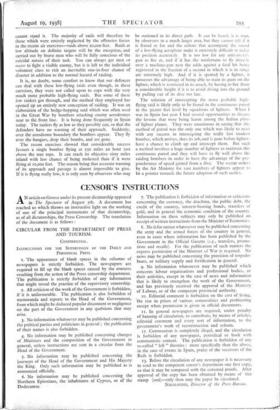CENSOR'S INSTRUCTIONS
A N article on Greece under its present dictatorship appeared . in: The Spectator of August 5th. A document has reached us which throws an instructive light on the working of one of the principal instruments of that dictatorship, as of all dictatorships, the Press Censorship. The translation of the document is as follows : CIRCULAR FROM THE DEPARTMENT OF PRESS AND TOURISM.
CONFIDENTIAL.
INSTRUCTIONS FOR THE SUPERVISION OF THE DAILY AND PERIODICAL PRESS.
i. The appearance of blank spaces in the columns of newspapers is strictly forbidden. The newspapers are required. to fill up the blank spaces caused by the erasures resulting from the action of the Press censorship department. The publication is strictly, forbidden of any information that might reveal the practice of the supervisory censorship.
2. All criticism of the work of the Government is forbidden, if it is unfavourable. The publication is also forbidden of memoranda and reports to the Head of the Government, from which might be deduced popular discontent or negligence on the part of the Government in any questions that may arise.
3. No information whatsoever may be published concerning the political parties and politicians in general ; the publication of their names is also forbidden.
4. No information may be published concerning changes of Ministers and the composition of the Government in general, unless instructions are sent in a circular from the Head of the Government.
5. No information may be published concerning the journeys of the Head of the Government and His Majesty the King. Only. such information may be published as is announced officially.
6. No information may be published concerning the Northern Epirotians, the'inhabitants of Cyprus, or of the Dodecanese.' 7. The publication is forbidden of information or criticisms concerning the currency, the drachma, the public debt, the credit of the country, interest-bearing bonds, transfers of gold, and in general the economic condition of the country. Information on these subjects may only be published on receipt of written instructions from the Minister of Economics.
8. No information whatsoever may be published concerning the army and the armed forces of the country in general, even in cases where information has been published by the Government in the Official Gazette (e.g., transfers, promo- tions and recalls). For the publication of such matters the express permission of the Minister of War is required. No news may be published concerning the provision of torpedo- boats, or military supply and fortification in general.
9. No information whatsoever may be published which concerns labour organisations and professional bodies, or their activities, except in the case of news and information that is likely to strengthen the work of the Government, and has previously received the approval of the Ministry of Labour, or of the competent provincial authority.
io. Editorial comment is forbidden on the cost of living, the rise in prices of various commodities and profiteering except when permission is given in official documents.
ii. In general newspapers are required, under penalty of banning of circulation, to contribute, by means of articles, editorial comment and every sort of information, to the government's work of reconstruction and reform.
12. Communism is completely illegal, and the circulation is forbidden of any newspaper, periodical or book with communistic content. The publication is forbidden of any so-called " left " theories : more specifically than the above, in the case of events in Spain, praise of the successes of the Reds is forbidden.
13. Before the circulation of any newspaper it is necessary to send to the competent censor's department one first copy, so that it may be compared with the censored proofs. After approval of the copy has been obtained by means of this stamp (seal)—only then may the paper be circulated.
NIKOLOUDIS, Director of the Press Bureau.






































 Previous page
Previous page